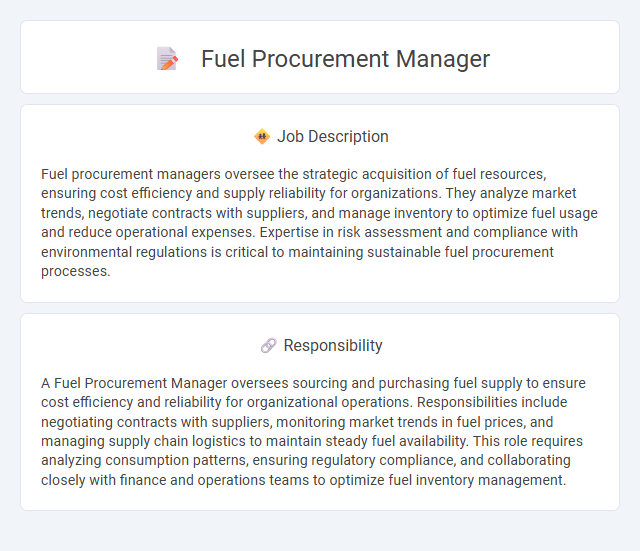
Fuel procurement managers oversee the strategic acquisition of fuel resources, ensuring cost efficiency and supply reliability for organizations. They analyze market trends, negotiate contracts with suppliers, and manage inventory to optimize fuel usage and reduce operational expenses. Expertise in risk assessment and compliance with environmental regulations is critical to maintaining sustainable fuel procurement processes.
Individuals with strong analytical skills and attention to detail are likely to be well-suited for the role of a Fuel Procurement Manager, given the job's demand for negotiating contracts and managing supply chains effectively. Candidates who thrive in high-pressure environments and possess excellent communication abilities may find themselves more successful in coordinating with suppliers and internal teams. Those with a proactive mindset and adaptability could probably navigate market fluctuations and regulatory changes inherent to this position.
Qualification
A Fuel Procurement Manager must possess a strong background in supply chain management and expertise in energy markets, alongside a bachelor's degree in business administration, logistics, or a related field. Proven experience in negotiating contracts, managing vendor relationships, and analyzing fuelprice trends is essential to optimize procurement strategies. Advanced skills in data analysis, risk management, and regulatory compliance further enhance the ability to secure cost-effective fuel supplies while maintaining operational efficiency.
Responsibility
A Fuel Procurement Manager oversees sourcing and purchasing fuel supply to ensure cost efficiency and reliability for organizational operations. Responsibilities include negotiating contracts with suppliers, monitoring market trends in fuel prices, and managing supply chain logistics to maintain steady fuel availability. This role requires analyzing consumption patterns, ensuring regulatory compliance, and collaborating closely with finance and operations teams to optimize fuel inventory management.
Benefit
A fuel procurement manager likely ensures cost-effective purchasing strategies that reduce overall fuel expenses for the company. They probably secure reliable supply contracts, minimizing risks associated with market volatility and supply disruptions. Their expertise may contribute to improved operational efficiency and enhanced budget forecasting accuracy.
Challenge
Fuel procurement managers likely face challenges related to fluctuating global oil prices and supply chain disruptions, requiring strategic risk management and negotiation skills. They probably encounter difficulties in securing reliable suppliers while maintaining cost efficiency amid market volatility. Adapting to evolving environmental regulations might also pose challenges in aligning procurement strategies with sustainability goals.
Career Advancement
Fuel procurement managers play a critical role in overseeing the acquisition of fuel resources, negotiating contracts, and managing supplier relationships to optimize cost-efficiency and ensure supply stability. Career advancement opportunities often lead to senior roles such as Procurement Director or Supply Chain Manager, where strategic decision-making and leadership responsibilities expand. Developing expertise in market analysis, risk management, and sustainability initiatives strengthens professional growth and positions candidates for executive-level positions in energy and transportation sectors.
 kuljobs.com
kuljobs.com